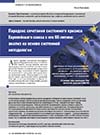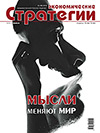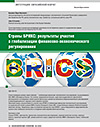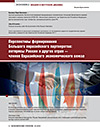Paradox of Combining the European Union’s Systemic Crisis with Its 60th Anniversary: Analysis Based on a Systemic Methodology
DOI: 10.33917/es-6.164.2019.54-59
The article analyzes fundamental reasons for such unexpected coincidence of the European Union systemic crisis with its 60th anniversary as well as the prospects for the European integration development. The innovative nature of the study consists in the fact that the problems are considered on the basis of a systemic methodology, that determines its logic, and the principles of systematic approach, as well as in the context of paradox theory. This approach allows us to analyze the causes of the EU systemic crisis that coincided with its anniversary, making a conclusion that seems unbelievable but contains the truth. Processing of materials over 60 years of the European integration revealed a number of paradoxes, including the lack of previously developed concept, systematic violation of the EU development patterns. The author identifies the paradox of US–EU transatlantic cooperation, which manifested itself through the loss of economic sovereignty of the states participating in the European integration under American pressure and with regard to deployment of NATO military bases in Europe. The author comes to conclusion that violation of the integration process patterns and rules manifested itself as a result of the global crisis of 2008–2009.







